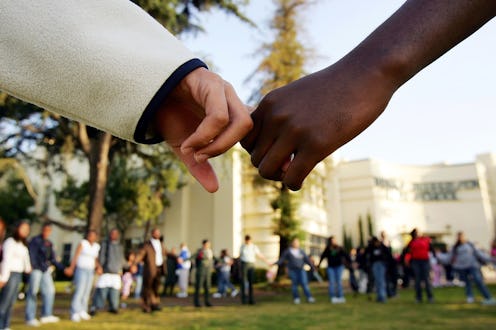News
Your Liberal Bubble Might Not Be As Liberal As You Think It Is

If you're white and politically progressive, or concerned with the effects of racism on society, there's something you should know. According to a recent survey, a majority of white Americans now believe that anti-white racial discrimination is a real issue in American society today. And when you dig into the numbers, one thing becomes clear: This thinking also takes place in ostensible "liberal bubbles," because white people in diverse cities think they're discriminated against, too.
It's not just those living in rural communities, with fewer people of color around them; more than half of white Americans feel this way, including those who live in places that are a lot more racially and culturally diverse. The survey, commissioned by National Public Radio, the Robert Wood Johnson Foundation, and the Harvard T.H. Chan School of Public Health, found that 55 percent of white Americans overall believe white people are racially discriminated against in society today.
The survey also shows, however, the majority of white Americans — no matter where they live — believe that. White people who live in the suburbs are actually the least likely to believe they are racially discriminated against, with just 50 percent of them answering yes, while in rural and urban communities it's a much more popular notion.
Specifically, 61 percent of white Americans living in urban environments feel that white people are racially discriminated against, as compared to 63 percent of rural whites.
Despite there being little difference between the attitudes of urban and rural whites on this question, there's a sharper divide based on what region of the country you live in. White Americans residing in the West believe in anti-white racial discrimination at a rate of 51 percent, compared to 52 percent in the Midwest, and 43 percent in the Northeast. Southern whites, however, answered yes a whopping 67 percent of the time, more often than whites in any other region of the country.
That's a particularly stark figure, given that the American South has itself been home to some of the most brutal white supremacist acts and institutions in American history, from slavery, to lynchings, to segregation.
It's also a far more prevalent belief among cisgender, heterosexual white Americans than LGTBQ ones. According to the survey, 56 percent of non-LGBTQ whites believe racial prejudice against whites exists today, while 40 percent of LGBTQ ones do.
Another extremely strong indicator of whether you believe anti-white racial bias is happening today is political party affiliation, with 74 percent of white Republicans answering yes, while only 28 percent of Democrats believe similarly.
The survey also shows, as Wesleyan University assistant professor of psychology Clara Wilkins noted last week for The Conversation, that as more white Americans have become convinced that anti-white racial bias is working against them, they've also become less convinced that black Americans face such bias. A reported 31 percent of whites who believe in anti-white racial bias told the survey's researchers they'd been discriminated against when applying for jobs, too, while 19 percent said they'd been treated unfairly in promotions or equal pay.
A reported 10 percent claimed they or a family member had been treated unfairly by the police as a result of being white. Hostile, violent, and sometimes lethal treatment of people of color by the police has been a flashpoint racial justice issue in recent years — but from the looks of things, about one in 10 white Americans believe their whiteness has disadvantaged them in dealing with law enforcement.
The full survey, titled "Discrimination In America: Experiences And Views Of White Americans" is full of interesting and potentially hugely consequential findings on how white Americans view themselves and their experiences, and its findings could have considerable implications for the current political moment — President Donald Trump, after all, has been repeatedly accused of stoking racism throughout his presidency.